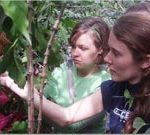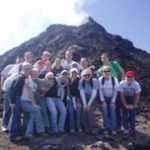A group of 24 students, two faculty and one staff member recently returned from a three-week Academic Service Learning course in Guatemala, where they worked with Habitat for Humanity building “simple and decent” housing. Details...

The course, Culture and Service in Guatemala, examines the history and culture of this war ravaged country and incorporates service so that the students have the opportunity to work alongside organizations and communities striving to promote peace and justice within the country. Faculty members for the course were Jim Pickens, associate professor of psychology, and Judy Esposito, assistant professor of Human Services.
The group began their course in the town of Antigua where students visited local non-governmental organizations and participated in Spanish lessons, said Jenny Trimble, director of the Kernodle Center for Service Learning. The students visited a Women’s Co-Op of indigenous people who make crafts to support the education of the 500 children in a village with a total population of 700. The group also visited a Coffee Finca (coffee farm) and worked alongside the coffee pickers, before getting a tour of the cultural museum.
Students were able to ask the farm owner questions related to fair trade practices, education and child labor. The last two organizations that the students visited were two schools who worked to educate the “poorest of the poor” in Guatemala, said Trimble. Safe Passage is an organization that is based in Guatemala City and works to provide a safe place to educate youth whose families make their livelihood sifting though garbage and the city dump. The second organization was called Global Vision. Students visited two schools that focused on educating children who live in rural communities. Elon students played with the youth during play time and hosted a Christmas party for the students. The group ended their time in Antiqua with a challenging climb up the Pacaya Volcano.

The next week and a half, the group worked with Habitat for Humanity Global Village in the former Mayan capital of Quetzaltenango, or locally called Xelaju (pronounced Sha-La). The students were divided into three teams and worked alongside three diverse families in building housing. “The families were so unique and provided the students with the opportunity to learn and experience the unique richness of the Guatemalan culture,” said Trimble. The students worked from 8 a.m. until 4 p.m. six days a week.
The visit began with a welcoming ceremony and ended with a closing celebration in which the families and students shared thanks and gave each other gifts to celebrate the relationships and work that they had accomplished.


